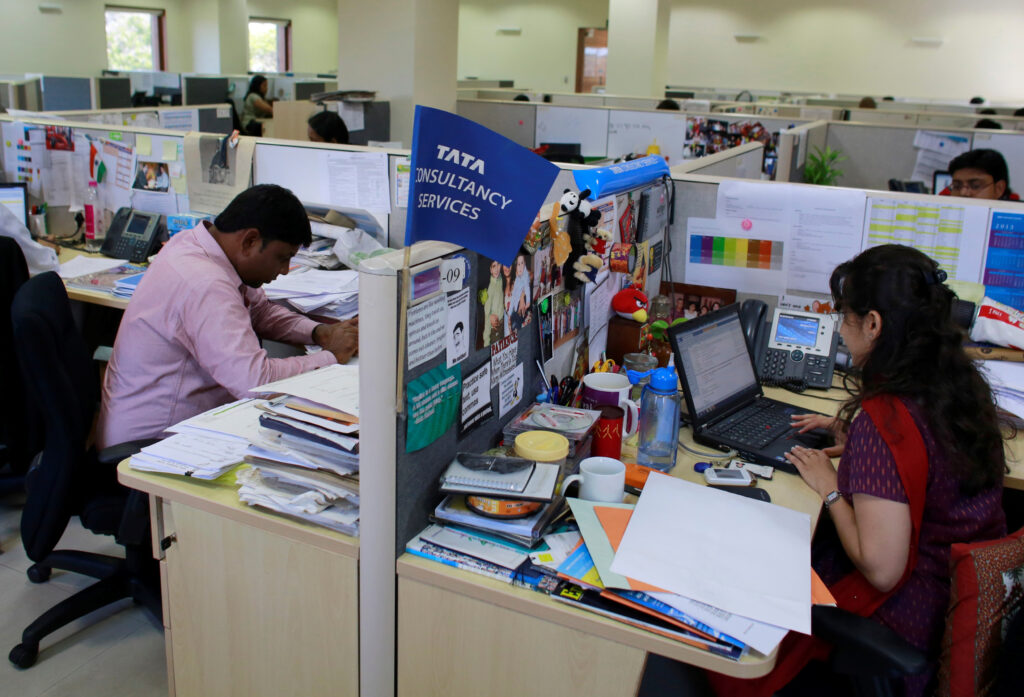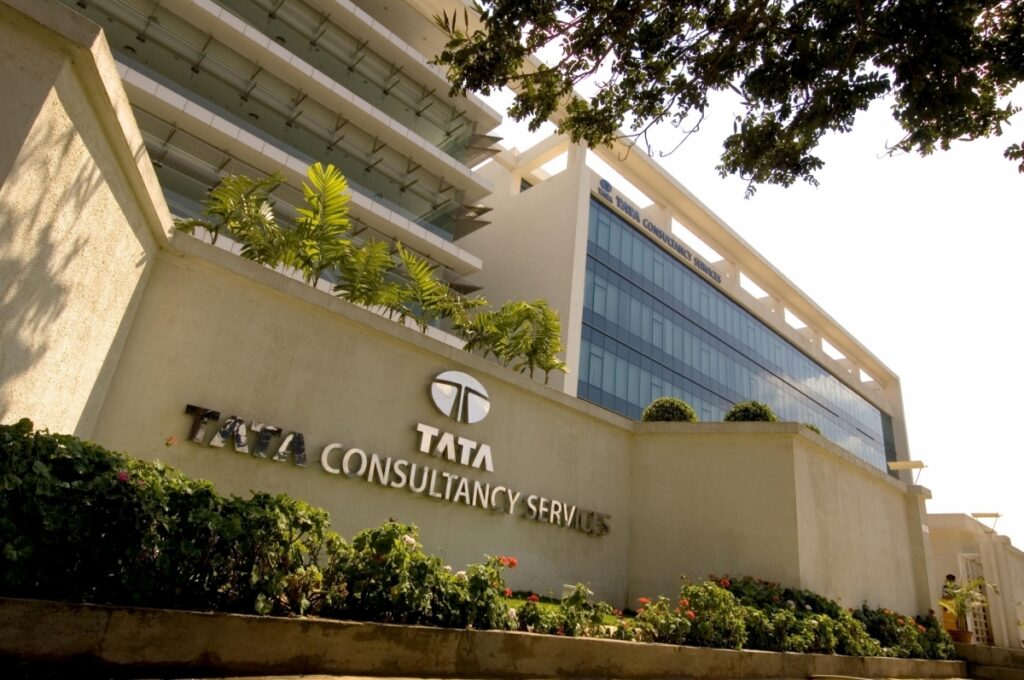Tata Consultancy Services (TCS), India’s largest IT services provider, continues to lead the global technology landscape with its Q1 FY26 results, showcasing resilience amid macroeconomic challenges. With a net profit of ₹12,760 crore, up 6% year-over-year, and a robust $9.4 billion in Total Contract Value (TCV), TCS is driving digital transformation through AI, cloud computing, and cybersecurity.
As the IT sector evolves, TCS’s partnerships with global giants like Google Cloud, Microsoft, and NVIDIA position it at the forefront of innovation. For investors eyeing the $1 trillion IT services market, YTC Ventures offers a gateway to fund transformative tech ventures inspired by TCS’s success. This article explores TCS’s Q1 performance, key innovations, and why YTC Ventures is the ideal partner for investors in 2025.

TCS Q1 FY26 Performance: A Snapshot of Resilience
TCS reported a consolidated net profit of ₹12,760 crore for Q1 FY26 (April-June 2025), a 6% increase from ₹12,040 crore in the same period last year, surpassing market expectations of ₹12,205 crore. Despite a 3.3% sequential revenue decline in constant currency terms, largely due to the BSNL deal ramp-down, TCS achieved operational revenue of ₹63,437 crore, up 1.3% year-over-year. The company declared an interim dividend of ₹11 per share, payable on August 4, 2025, reinforcing its shareholder value.
TCS’s stock price, trading at ₹3,382 on July 10, 2025, reflects a market capitalization of ₹12.24 trillion, though it faced a 2.34% dip post-earnings due to cautious investor sentiment. Analysts remain optimistic, with JM Financial setting a target price of ₹3,950, citing TCS’s strong deal pipeline and potential recovery as macroeconomic uncertainties ease.
Key Growth Drivers: AI, Cloud, and Cybersecurity
TCS’s Q1 growth was propelled by its AI and Data, TCS Interactive, and Cybersecurity units, as highlighted by CEO K Krithivasan. Key deal wins included operating model transformations, vendor consolidation, and AI-powered SAP S/4HANA projects. TCS’s partnerships, such as with Khan Bank to enhance customer experience through AI and ML, and the Council of Europe Development Bank to streamline reconciliation with TCS BaNCS, underscore its focus on intelligent automation.

The company’s Global Securities Platform (GSP) was named the “Best Global Settlement Solution” at the 2025 FTF News Technology Innovation Awards, reflecting its leadership in financial technology.
TCS applied for 171 patents in Q1, with 119 granted, bringing its total to 8,987 applications and 4,939 grants as of June 30, 2025.
TCS’s Innovation Ecosystem: Shaping the Future
Founded in 1968 and headquartered in Mumbai, TCS operates in 150 locations across 46 countries, employing 613,069 associates as of June 30, 2025. Its investments in emerging technologies—AI, cloud computing, IoT, and 5G—have solidified its position as a global IT leader. TCS’s collaboration with Google Cloud to accelerate AI-led retail transformation and NVIDIA for AI-native telecom solutions highlights its role in redefining industries.
The company’s IoT and Digital Engineering unit saw strong demand for connected plants, smart manufacturing, and software-defined vehicles, while its Cognitive Business Operations secured large deals in M&A and infrastructure services. TCS’s commitment to sustainability, including net-zero carbon emission targets, aligns with global trends, making it a trusted partner for enterprises.
Challenges and Opportunities in FY26
Despite its strong Q1, TCS faced challenges, including a $50 million-plus client decline and project ramp-up delays due to clients’ focus on return on investment (ROI). The BFSI (Banking, Financial Services, and Insurance) sector showed steady demand in the US and UK but caution in Europe, while CPG and retail faced high-cost pressures from tariffs and supply chain disruptions.

However, TCS’s management remains confident, expecting FY26 to outperform FY25 as global uncertainties settle. The company’s focus on upskilling, with 15 million hours invested in emerging tech competencies, positions it to capture market share in AI, cloud, and cybersecurity. Analysts like Sharekhan (target price ₹4,050) and Prabhudas Lilladher (₹4,160) see TCS as a “Buy” for long-term investors, citing its robust order book and innovation pipeline.
TCS Financial Triumph in Q1 FY26: A 5-Year Balance Sheet Analysis and Investment Opportunities with YTC Ventures
Tata Consultancy Services (TCS), India’s leading IT services giant, continues to dominate the global technology landscape, reporting a robust Q1 FY26 net profit of ₹12,760 crore, up 6% year-over-year. With a market capitalization of ₹12.24 trillion as of July 10, 2025, TCS is a beacon of financial stability and innovation. This article provides a detailed 5-year balance sheet analysis (FY20-FY24), highlights TCS’s top-paying clients, global office network, asset portfolio, and Indian city-wise employee distribution. Inspired by the resilience of TCS and figures like Amanda Anisimova in her Wimbledon 2025 final run, we explore why YTC Ventures is the ideal platform for investors to capitalize on the $1 trillion IT services market and the $614 billion sports industry.

TCS 5-Year Balance Sheet Analysis (FY20-FY24 – Values in CR INR)
TCS’s financial performance over the past five years reflects its ability to sustain growth despite global economic challenges. Below is a consolidated analysis based on available data from annual reports and financial statements, focusing on key metrics like total assets, liabilities, revenue, net profit, and cash flows. All figures are in millions of INR unless stated otherwise.
- Revenue Growth:
- FY20: ₹1,615,410
- FY21: ₹1,641,770
- FY22: ₹1,917,540
- FY23: ₹2,290,680
- FY24: ₹2,453,150
- CAGR: 11.0% over five years, driven by demand for digital transformation, AI, and cloud services. However, FY23 and FY24 saw slower growth (17.6% and 6.8% YoY, respectively) due to macroeconomic headwinds and client spending caution in BFSI and retail sectors.

- Net Profit:
- FY20: ₹324,470
- FY21: ₹325,620
- FY22: ₹384,490
- FY23: ₹423,030
- FY24: ₹460,990
- CAGR: 9.2% over five years. Net profit margins improved from 18.8% in FY23 to 19.1% in FY24, though they remained below the 20.1% peak in FY22 due to higher employee costs (57.1% of operating revenue in FY24) and project ramp-downs.
- Total Assets:
- FY20: ₹1,208,970
- FY21: ₹1,307,110
- FY22: ₹1,378,000
- FY23: ₹1,403,000
- FY24: ₹1,430,000
- Growth: 2% YoY in FY24, with current assets at ₹1,130,000 and fixed assets at ₹301,000. TCS’s asset growth reflects investments in technology infrastructure and R&D, though fixed asset growth slowed to 0% in FY24 due to optimized capital allocation.
- Total Liabilities:
- FY20: ₹426,360
- FY21: ₹430,000
- FY22: ₹424,000
- FY23: ₹436,000
- FY24: ₹461,000
- Growth: 5.8% YoY in FY24, driven by a rise in current liabilities (₹461 billion). TCS maintains a debt-free balance sheet, enhancing financial stability compared to peers like Infosys and Wipro.

- Cash Flows:
- Operating Cash Flow (CFO):
- FY20: ₹323,080
- FY21: ₹388,020
- FY22: ₹399,490
- FY23: ₹419,650
- FY24: ₹443,380
- Growth: 5.7% YoY in FY24, reflecting strong liquidity and operational efficiency.
- Investing Cash Flow (CFI):
- FY20: ₹-37,800
- FY21: ₹-30,600
- FY22: ₹-8,970
- FY23: ₹390
- FY24: ₹60,260
- Trend: Significant improvement in FY24 (15,351.3% YoY) due to strategic investments in AI and cloud infrastructure.
- Operating Cash Flow (CFO):

- Financing Cash Flow (CFF):
- FY20: ₹-279,260
- FY21: ₹-349,780
- FY22: ₹-404,050
- FY23: ₹-479,000
- FY24: ₹-485,000
- Trend: Consistent outflows due to dividends (e.g., ₹11 interim dividend in Q1 FY26) and share buybacks (₹16,000 crore in 2017).
- Net Cash Flow:
- FY20: ₹6,020
- FY21: ₹7,640
- FY22: ₹56,000
- FY23: ₹-54,000
- FY24: ₹19,000
- Insight: Volatility reflects dividend payouts and buybacks, but positive FY24 net cash flow indicates robust liquidity.
- Key Ratios:
- Return on Capital Employed (ROCE): Improved from 58.9% (FY22) to 69.4% (FY24), showcasing efficient capital utilization.
- Return on Assets (ROA): Rose from 28.5% (FY22) to 32.8% (FY24), reflecting better asset efficiency.
- Debt-to-Equity Ratio: 9.81% (TTM, Q1 FY25), low due to TCS’s debt-free status.
- Price-to-Book Ratio: 12.78 (Q1 FY25), indicating premium valuation but potential overvaluation compared to peers (median peer P/B: ~3-4).
- Net Profit Margin: 19.02% (TTM, Q1 FY25), competitive but slightly below historical highs due to cost pressures.

Critical Analysis:
TCS’s balance sheet is robust, with no debt and strong cash flows, but its 10.2% revenue growth over five years (FY19-FY23) lags behind peers like Infosys (13.5% CAGR). High employee costs and cautious client spending in BFSI and retail sectors pose risks, but TCS’s focus on AI and cloud mitigates these through diversified revenue streams. The stock’s high P/B ratio suggests investor confidence but warrants caution for value investors.
Top-Paying Clients of TCS
TCS serves over 1,000 clients across industries, with significant revenue from BFSI (30.9%), retail (15.4%), life sciences (11%), and manufacturing (8.8%) in Q1 FY25. While specific client revenue details are not publicly disclosed, key high-value clients include:
- General Motors: TCS provides digital transformation and IT outsourcing services, focusing on automotive IoT and software-defined vehicles.
- Cisco: Leverages TCS’s cybersecurity and cloud solutions for network transformation.
- Thomson Reuters: Utilizes TCS’s AI and data analytics for legal and financial platforms.
- Air New Zealand: Signed a 5-year digital infrastructure deal in 2022, focusing on AI innovation.
- Khan Bank: Partners for AI and ML-driven customer experience enhancements.
- Council of Europe Development Bank: Uses TCS BaNCS for financial reconciliation.
- Indian Department of Posts: A ₹11 billion contract (2013) for IT services, likely renewed or expanded.
- BFSI Clients: Major banks like Citigroup, HSBC, and JPMorgan contribute significantly to TCS’s 30.9% BFSI revenue, relying on TCS BaNCS and SAP S/4HANA solutions.

Insight:
BFSI clients, particularly US and UK banks, are TCS’s largest revenue contributors, but the company’s diversified portfolio across manufacturing, healthcare, and telecom reduces dependency on any single client.
Lack of transparency on exact client contributions limits precise analysis, but large deals (e.g., $9.4 billion TCV in Q1 FY26) indicate strong client trust.
TCS Global Office Network
TCS operates in 150 locations across 46 countries, with a strong presence in North America, Europe, and Asia-Pacific. Key office highlights include:
- North America: Over 46,000 employees across the US and Canada, with major offices in New York, Santa Clara (Digital Reimagination Studio), and Toronto.
- Europe: Offices in London, Amsterdam, and Zurich, supporting BFSI and retail clients.
- Asia-Pacific: Presence in Singapore, Tokyo (TCS Japan), and Sydney, with a joint venture in China.
- India: Major hubs in Mumbai (headquarters), Bengaluru, Chennai, Hyderabad, Pune, Delhi, Kolkata, and 20+ other cities (see employee count below).
- Other Regions: Offices in Latin America (e.g., São Paulo), Middle East (Dubai), and Africa (Johannesburg), catering to emerging markets with 61.8% YoY growth in India.

Insight:
TCS’s global footprint supports its ability to serve diverse markets, but its heavy reliance on India-based operations (bulk of workforce) exposes it to domestic cost pressures and currency fluctuations.
TCS Assets
TCS’s total assets stood at ₹1,596,290 million in Q1 FY25, comprising:
- Current Assets (₹1,130,000 million, FY24): Cash and cash equivalents, short-term investments, and accounts receivable, supporting liquidity for dividends and buybacks.
- Fixed Assets (₹301,000 million, FY24): Technology infrastructure (data centers, cloud platforms), R&D facilities like TRDDC, and proprietary platforms like ignio™, Cognix™, and TCS BaNCS.
- Intangible Assets: 8,987 patent applications (4,939 granted), including MasterCraft (model-driven development software) and Sujal (low-cost water purifier).
- Real Estate: Offices in 150 locations, including innovation labs in Mumbai, Santa Clara, and Singapore.
- Brand Value: Valued at $44.79 billion (Kantar BrandZ, 2024), with a 7% YoY increase.
Critical Analysis:
TCS’s asset base is strong, with significant investments in intellectual property and digital infrastructure. However, the lack of detailed breakdowns for fixed assets (e.g., specific data center valuations) limits transparency.
The high brand value enhances investor appeal but may inflate valuations.

Indian City-Wise Employee Count
As of June 30, 2025, TCS’s global workforce is 613,069, with the majority based in India. Precise city-wise data is not fully disclosed, but based on available information and estimates:
- Chennai: ~70,000 employees, a major hub for BFSI and manufacturing projects.
- Bengaluru: ~28,000, focusing on AI, cloud, and R&D at TRDDC.
- Mumbai: ~20,000-25,000, headquarters hosting corporate and innovation functions.
- Delhi/Noida/Gurugram: ~20,000-25,000, serving government and BFSI clients.
- Kolkata: ~20,000-25,000, supporting IT outsourcing and analytics.
- Hyderabad: ~25,000-30,000, a key center for digital transformation and IoT.
- Pune: ~20,000-25,000, focusing on engineering and cybersecurity.
- Other Cities (e.g., Ahmedabad, Bhubaneswar, Coimbatore, Kochi, Thiruvananthapuram): ~5,000-10,000 each, totaling ~100,000 across smaller hubs.
Insight:
With 35.5% women and 151 nationalities, TCS’s Indian workforce is diverse but concentrated in major cities, reflecting infrastructure availability. The lack of precise, up-to-date city-wise data from TCS limits accuracy, and estimates rely on older sources (e.g., 2017 Quora post). Attrition at 12.1% (Q1 FY26) suggests retention challenges in competitive hubs like Bengaluru.
Why Invest in Tech with YTC Ventures?
TCS’s success mirrors the transformative potential of the IT and sports industries, both driven by innovation and resilience. Just as Amanda Anisimova’s journey to the Wimbledon 2025 final captivated fans with her AI-driven training and mental health advocacy, TCS leverages AI to redefine business landscapes. YTC Ventures invites investors to capitalize on this $1 trillion IT services market and the $614 billion sports industry by funding cutting-edge startups in AI-driven training, fan engagement platforms, and sustainable tech.
Contact YTC Ventures to invest in IT sector investments@ytcventures.com
Whats App “INVEST” to +91-9380376419
With TCS’s stock showing long-term potential despite short-term volatility, YTC Ventures offers a gateway to invest in the next wave of tech and sports innovation.

Conclusion
TCS’s 5-year balance sheet reflects financial resilience, with 11% revenue CAGR, 9.2% profit CAGR, and a debt-free structure. Its top clients, like General Motors and Citigroup, drive BFSI revenue, while its 150 global offices and ₹1.59 trillion in assets underscore its scale. Indian hubs like Chennai and Bengaluru power its 613,069-strong workforce. For investors, YTC Ventures offers a gateway to capitalize on TCS’s tech legacy and the sports industry’s growth. Join YTC Ventures today to invest in innovation

Comments